Seven Issues for Scotland to Solve in Seven Months before the World Cup
From age profiles and Gannon-Doak’s hamstring to draws of death and altitude sickness... Stephen McGowan map out the challenges and potential pitfalls that face Clarke’s Hampden heroes
Scotland are going to next summer’s World Cup. And, with seven months to go until the opening ceremony in Mexico City on June 11, Nutmeg FC looks at seven key issues facing Steve Clarke and the Scottish FA before the team’s first appearance on world football’s biggest stage since 1998.
By Stephen McGowan
NO GANNON-DOAK, NO LEGS
When Ben Gannon-Doak fell to the ground after 17 minutes of the epic win over Denmark Hampden held its breath. At 20 years old, Bournemouth’s £25million winger was both the youngest member of the starting 11 and the quickest. Occupying Manchester United’s Patrick Dorgu in the opening period of the game, he claimed an assist for Scott McTominay’s stunning overhead kick. The minute he succumbed to a hamstring issue it felt like someone had taken a pin and deflated the air from Scotland’s National Stadium.
Steve Clarke’s bench offered no viable alternatives. While the introduction of holding midfield Kenny McLean paid out in the final act of the match, it gave the home team a problem. While Ryan Christie was moved to the right, the Bournemouth man is no winger and wouldn’t claim to be.
With no Gannon-Doak to scurry down the right channel, Scotland had no out ball. Long balls were thumped up the park, surrendering possession to the opposition. Dorgu was now free to provide another Danish attacking outlet, claiming the goal which so nearly condemned Scotland to the play-offs.
While John McGinn and Gannon-Doak do a sterling job in wide areas, alternative options are thin on the ground. Clarke spoke to Harvey Barnes two years ago and might feel the onus is now on the Newcastle man to come to him.
Reared at Celtic, Karamoko Dembele chose England ahead of Scotland, but shows no sign of an international breakthrough playing for QPR in the Championship. Might he reconsider?
Last, but not least, is James Forrest. The veteran Celtic winger went to Euro 2024 and failed to play a minute. Given the number of 30-something players in the squad, there might be a reluctance to add another one.



A SQUAD THAT ISN’T GETTING ANY YOUNGER
Appointed in 2019, Clarke wanted to emulate nations like Croatia by building up the number of caps in the squad. He wanted players to assemble international experience and know-how.
During his six years in charge, captain Andrew Robertson has made it to 90 caps and will comfortably reach 100 should he choose. Goalkeeper Craig Gordon has 83, McGinn 80, Scott McTominay has 65, Grant Hanley 64 and Ryan Christie 62.
A club ethos has propelled Scotland to three major finals, but it comes at a price. While this will be remembered as a successful era for the national team, an excellent group of players are coming to the end of their cycle. They are growing old together.
The oldest European to play in a World Cup qualifier — beating a 60-year record held by Sir Stanley Matthews — Gordon will be 43 on New Year’s Eve. Now behind Alexander Schwolow on the Hearts bench, he could go out on loan for the second half of the season in order to enhance his hopes of becoming the second-oldest player in World Cup history. Then again, Derek McInnes might be reluctant to let his number two keeper go.
It’s not just Gordon. Grant Hanley and Kenny McLean are 33, Andy Robertson is 31, Ryan Christie, Jack Hendry, Lyndon Dykes and Lawrence Shankland are 30, John McGinn is 31 and John Souttar and Che Adams are 29. Aaron Hickey and Ben Gannon Doak were the only players under the age of 25.
The oldest squad at Euro 2024, there’s a chance of Scotland also being the most experienced group of players in America, Canada and Mexico. The average age of the starting line-up in the 3-2 defeat to Greece was 29 years and 11 months.
Given Clarke’s loyalty to the players who serve him so well — and the relative paucity of talent, don’t hold your breath waiting for an injection of youthful vigour before June.
THE AUTUMN OF STEVE CLARKE
Clarke is under contract until the end of the current World Cup campaign. By the end of the finals the 62-year-old will have been in charge for almost seven years.
After the Denmark triumph, the Ayrshireman spoke of keeping an open mind regarding his future. So long as the uncertainty remains, journalists will continue to ask the question right up until the finals.
In the euphoria of Hampden people saw a different side to Clarke. So often taciturn, slightly dour and as guarded as the ramparts of Edinburgh Castle, supporters think that’s reflected in his tactics. Images of an embrace with captain Andrew Robertson revealed a side to the manager the outside world rarely sees.
The finest Scotland coach of a generation, indifference and hostility towards him stem from a combination of his tournament record, demeanour, overfamiliarity and boredom. In an era when everything from televisions to second hand cars are disposable, with a shelf life, football managers are no exception. By taking Scotland to three tournaments from four, Clarke has raised expectation and demands. And when an ageing team can’t go the extra mile, supporters yearn for something new and shiny on the driveway.
Scottish FA president Mike Mulraney appointed Clarke and has never altered his view that the Scotland job is his as long as he wants it. If Scotland have a good tournament, there might be a groundswell in favour of a new contract. Right now, that feels unlikely.
A new manager would mark a new era with a new squad of younger players. The World Cup finals feels like a natural break point for Scotland and for Clarke. Regardless of how the team perform in North America, the decision will be his and his alone.
REPEAT THE EUROS AND FORGET THE KNIGHTHOOD
The post-match euphoria of Denmark and all those populist calls to knight the manager won’t last long if Scotland play as poorly at the World Cup as they did at the last two Euros.
Clarke’s Scotland have breathed life into an old maxim: sometimes it really is better to travel than arrive. After strong qualifying campaigns, the national team have been an anti-climactic let-down at back-to-back tournaments.
A covid-affected Euro 2020 was a strange and unusual affair. Playing games at Hampden offered little advantage with a mere 12,000 fans in the old place. Despite a tactically astute 0-0 draw with England at Wembley, home defeats to the Czech Republic and a Luka Modric-inspired Croatia were underwhelming.
Germany 2024 was no better. The biggest act of misplaced Scots adventurism since the Darian project, the opening-night mauling to the hosts was an excruciating affair. While they rallied to earn a point against Switzerland, hopes of a historic place in the last 16 floundered after a dismal defeat to Hungary when the team failed to land a single shot on target. The Scots landed the fewest number of attempts on goal of any side in the tournament.
While other small nations like Georgia and Albania went hell for leather, Scotland were passive and overly cautious, raising an obvious question: is Clarke destined to be remembered as a manager who was good at taking the team to tournaments and no good at keeping them there? Or can these World Cup finals rewrite the narrative in an unexpectedly glorious fashion?
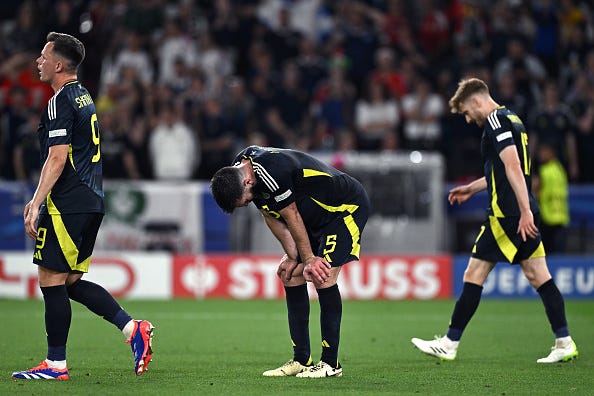
SCOTS WANT LUCK OF THE DRAW FOR CHRISTMAS 🎅
Scotland learn their group opponents on Friday December 5 when the draw takes place at the Kennedy Center in the United States capital of Washington D.C. Proceedings kick off at 5pm GMT and will be streamed live on FIFA’s website.
The biggest World Cup in history will feature 48 teams in 12 groups. The top two teams in each group plus the eight best-performing third-placed sides qualify for the last 32. While Scotland will never have a better chance to reach the knock-out stages of the World Cup, the national team has only ever won six of its 35 games at major tournaments.
Using world rankings, FIFA will divide the teams into four pots, with Scotland in pot three.
The three hosts — USA, Canada and Mexico — are all in pot 1. Despite home crowds, they should be weaker than some of the big guns placed in pot 1 on merit, such as Spain, Argentina, France, England or Brazil. In theory at least.
The pots are as follows:
Pot One: USA, Mexico, Canada, Spain, Argentina, France, England, Portugal, Brazil, Netherlands, Belgium, Germany.
Pot Two: Croatia, Morocco, Colombia, Uruguay, Switzerland, Japan, Senegal, Iran, South Korea, Ecuador, Austria, Australia.
Pot Three: Norway, Egypt, Algeria, Scotland, Paraguay, Ivory Coast, Tunisia, Uzbekistan, Qatar, Saudi Arabia, Panama, South Africa.
Pot Four: Curacao, Jordan, Haiti, Cape Verde, Ghana, New Zealand, UEFA Playoff 1, UEFA Playoff 2, UEFA Playoff 3, UEFA Playoff 4, Intercontinental Playoff 1, Intercontinental Playoff 2.
A subjective matter, the best and worst-case scenarios for Scotland would be along the following lines:
Group of Dreams: Canada, Australia, Scotland, Haiti.
Group of Death: Argentina, Croatia, Scotland, Italy.
EAST AND WEST ARE BEST
Like the draw itself, geography is pot luck. In an attempt to reduce travel between matches, the 16 host cities have been broadly grouped into three regions (Western, Central and Eastern).
Conditions in the south could hover around 40 degrees Celsius. Throw in altitude and Mexico City or the southern cities of the United States such as Dallas, Houston or Kansas would be good to miss.
For teams — and fans — the eastern zone is attractive in terms of travel and attractions. Toronto, Boston, New York and Philadelphia are accessible cities, the western zone of Seattle, Vancouver, Los Angeles and San Francisco a little less so.
Anyone old enough to recall the World Cups in USA (1994) and Mexico (1986) know that the landscape and the temperatures could pose a challenge as great as the opponents.
WE DON’T WISH TO BE VULGAR, BUT THE CASH WILL COME IN HANDY
Scotland’s governing body expect to rake in a sum in excess of £10m for reaching the World Cup. Once consigned to paper with a red pen, the governing body’s bottom line is now firmly in the black.
In November 2020 the SFA made 18 staff redundant in a cost-cutting programme triggered by a projected £4.5m loss as a consequence of covid.
Since then, Scotland’s national team have played in back-to-back Euros and qualified for the biggest tournament of them all. And nothing fills the coffers more than that.
Senior sources believe the three tournaments will deliver a sum in excess of £30m in total. On top of FIFA prize money, an appearance at a World Cup brings high-profile sponsors to the door while sales of a new World Cup kit should rake in another £1m.
A third of that cash will go towards travel, accommodation and logistics. Another third will be placed in a player bonus pool. Another chunk of the cash is likely to be diverted towards the Pitched In project, the ambitious brainchild of President Mulraney to raise £50m for the construction and improvement of new football facilities within five years.
Even then, the SFA come out quids-in as evidenced by the fact that the association turnover in 2021 was £22m. By this year, that figure had trebled to £78m with a profit of £7.5m.
Success on the pitch reaps generous dividends off it.
The latest issue of Nutmeg is rolling off the printing presses as we speak. It’s the ‘free-kick’ issue (see cover below) and features Stephen McGowan, Jonathan Northcroft, Charlie Mulgrew and a cameo appearance from the free-kick genius himself, Andrea Pirlo. The best deal to get on-board is our annual pass, which gets you full digital access AND the next FOUR copies of the magazine.


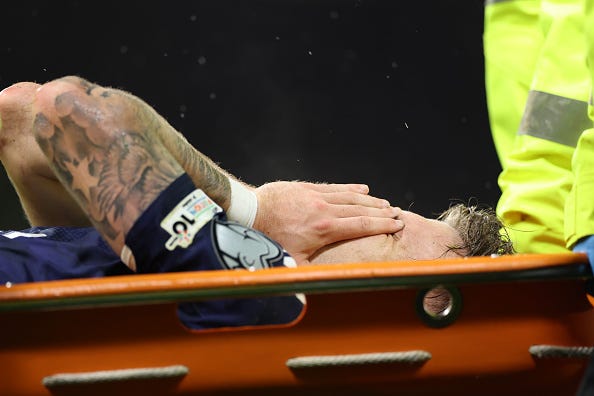
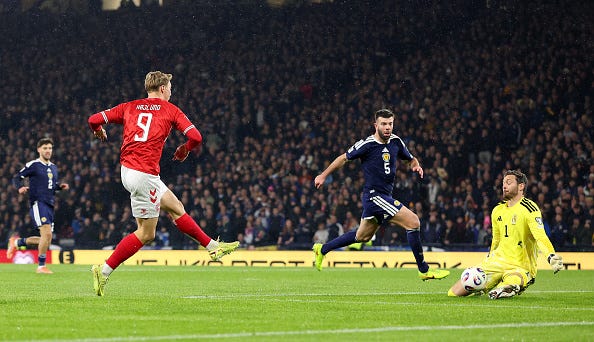
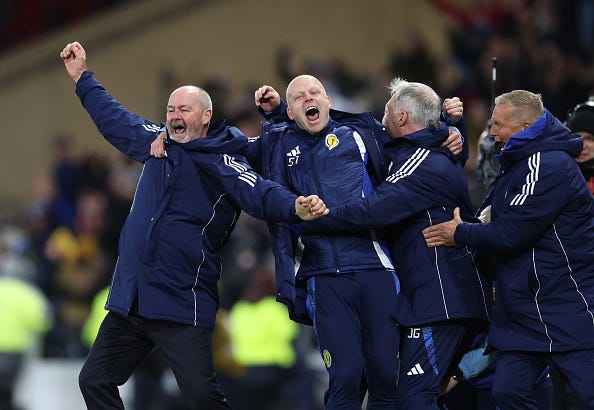
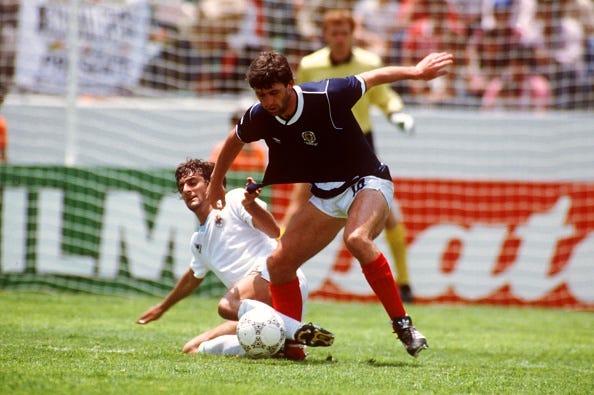
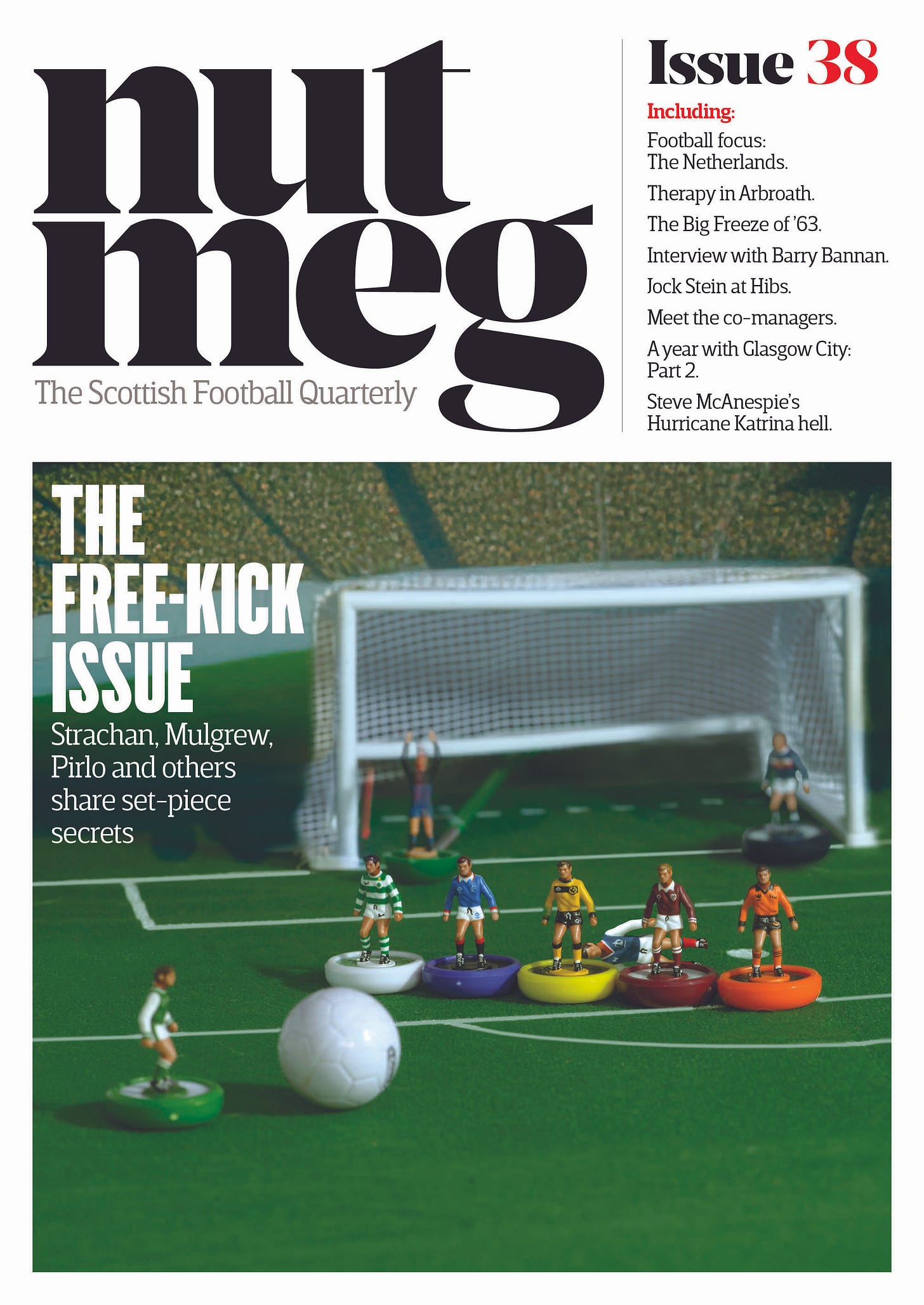
Good point on the pace. Maybe Oli Burke can play himself into contention.